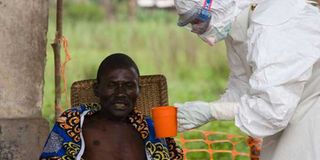Health ministry assures of measures to prevent Ebola

An international non-governmental organisation Doctors Without Borders (MSF) doctor Hilde Declerck (right) taking care of a 43-year-old patient, suffering from Ebola haemorrhagic fever (EHF) at an MSF isolation ward in Kampungu on October 1, 2007. PHOTO | CHRISTOPHER BLACK | AFP
What you need to know:
- The World Health Organisation confirmed cases of Ebola in DRC early this week, where three people have died so far in 19 suspected cases.
- The global vaccine alliance, GAVI, and pharmaceutical company Merck hinted at using the “opportunity” to launch the Ebola vaccine.
The government has stepped up surveillance at entry points into the country following the outbreak of lethal Ebola in the Democratic Republic of Congo (DRC).
Health Cabinet Secretary Cleopa Mailu said that all surveillance teams have been activated.
“We sent an alert to all counties, especially those at the borders, to look out for signs like fever and any other suspicious signs pointing to Ebola”, he told the Nation on phone on Tuesday.
The World Health Organisation (WHO) confirmed cases of Ebola in DRC early this week, where three people have died so far in 19 suspected cases.
This outbreak comes just a year after the end of an epidemic in West Africa that killed more than 11,300 people, mostly in Guinea, Sierra Leone and Liberia. It was termed the world’s worst Ebola outbreak which affected more than 28,600.
LETHARGIC RESPONSE
The WHO was criticised for a lethargic response to the disease, an omission that may have been a blessing in disguise as African nations such as Kenya strengthened their response to such attacks.
Also, the global vaccine alliance, GAVI, and pharmaceutical company Merck hinted at using the “opportunity” to launch the Ebola vaccine.
Kenya had sent a team of about 160 health workers to the affected countries to boost response efforts.
A statement sent to newsrooms by the Director of Medical Services Jackson Kioko also provides two numbers – 0732353535 and 0729471414 – for the public to inquire or report any suspected case of Ebola.
RISK OF IMPORTATION
“While the Ministry is fully aware of the seriousness of Ebola and the risk of importation of the virus to Kenya, we wish to assure the public that the outbreak has occurred in a remote zone in DRC and, with timely effective responses having been mounted, the disease is unlikely to spread widely in the region”, Dr Kioko wrote in his statement.
Dr Mailu said that there are forms that will be filled in at the airport, and should there be any suspect case, they will be traced and monitored in their homes.
“This is not just for people whose final destination is Kenya, but also for people who are in transit,” he said.
Hosting an international airport that acts as a stopover for most travellers in Africa, Kenya suspended some of its flights in the last bout of Ebola attacks in West Africa.
Dr Mailu said that there are also leaflets at the airport that the Ministry has issued to be given to travellers and workers to remind them of the need to be alert.
SCREENING EQUIPMENT
Dr Maurice Simiyu, Busia’s health executive, said that the national government gave the county special screening equipment.
“It is much quicker to screen people as they come through here, and that puts our minds at ease,” Dr Simiyu said.
Busia has two borders – Busia and Malaba – with heavy traffic from Rwanda, Uganda, Burundi and DRC.
Congo, whose dense forests contain the River Ebola near where the disease was first detected in 1976, has experienced many outbreaks and has mostly succeeded in containing the attacks without large-scale loss of life.
The East African Community may have opened the borders for trade as well as the ease at which infectious diseases can move from one country to another.
STRENGTHEN PARTNERSHIP
Dr Mailu added that this latest attack has prompted the government to strengthen the partnership between the human and veterinary departments in the country as the threat of Zoonoses increase.
Zoonoses are diseases that move from animals to man, making veterinarians a key component in responding to them.
Nevertheless, Kenya was the first country in the Eastern African region to have a Zoonotic Disease Unit (ZDU) in 2006 to tackle these kinds of outbreaks.
Kenya was also the first country in Africa to train elite squad of epidemiologists –those people who track how diseases break, spread and then they contain it— in a programme called Field Epidemiology and Laboratory Training Program (Feltp)
LATER DIED
The first case, which came April 22, involved a 45-year-old man. The taxi driver who took the man to the hospital and a person who cared for the man both became sick and later died, WHO said.
Ebola is a highly infectious virus spread through contact with bodily fluids, and testing shows the latest outbreak involves the Zaire strain, the most dangerous of the viruses known to cause the disease.
A 2007 outbreak of this strain in Congo had a fatality rate of 74 per cent, claiming 200 lives.
On Saturday, Dr Matshidiso Moeti, WHO’s regional director for Africa, met with national authorities in Kinshasa to discuss ways to mount a response to the outbreak.
“WHO has already mobilized technical experts to be deployed on the ground and is ready to provide the leadership and technical expertise required to mount a coordinated and effective response,” Moeti said.






